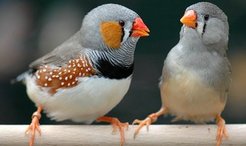Can female promiscuity evolve via indirect selection on male sex-drive?

Abstract Quantitative genetic analyses of male and female extra-pair mating behaviour in captive zebra finches have shown that female infidelity is positively genetically correlated with male sex drive (Forstmeier et al. 2011, PNAS 108:10608). This means that males with high sex drive will tend to sire daughters that are inclined to engage in extra-pair mating. To verify and further explore this finding we have established selection lines that have been selected over three consecutive generations for high versus low breeding values for male sex drive. The aim of the PhD project is to assess whether rates of female extra-pair mating (and hence extra-pair paternity) have indeed been altered by the indirect selection pressure exerted on males. If females from lines for high male sex-drive indeed show increased levels of extra-pair paternity (compared to control and low lines), the aim will be to characterize the behavioural differences among the selection lines (e.g. pair bond strength, sexual arousal).
Key words pair bonding, quantitative genetics, sexual behaviour, social monogamy, zebra finches
Main Advisor Wolfgang Forstmeier, MPIO Seewiesen
